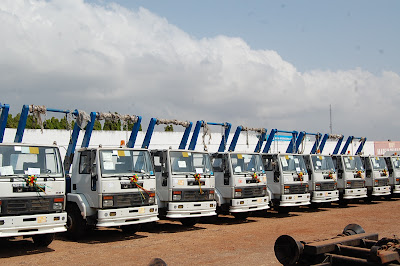BY EDMUND SMITH-ASANTE
Zoomlion Ghana Limited and Standard Bank have submitted documentation for the registration of the first Clean Development Mechanism (CDM) project in Ghana.
The CDM is a waste treatment project, which is expected to be completed before the end of 2011, and is the first state of the art composting and recycling plant to be built in Ghana.
Known as the Accra Compost and Recycling Plant, it is expected to provide integrated processing and management of solid and liquid waste, including domestic waste, hospital waste, industrial waste and e-waste.
Announcing this in a statement yesterday November 25, 2011, Zoomlion disclosed that when completed, the plant will be run on an eight-hour shift and will be able to process 300 tonnes of waste daily.
The plant is also expected to produce organic fertiliser that will be used for agricultural and horticultural purposes and recover metals and plastics for recycling.
Explaining what informed the project, the two collaborators said “Growing urbanisation in Ghana has led to an increasing number of landfill dump sites, which is both unsustainable and raises serious health concerns in the country. The waste treatment plant, and any further plants that are developed, will eventually eliminate the need for landfill dump sites in the country.”
According to the statement, the Accra Compost and Recycling Plant will generate carbon credits, which Standard Bank has agreed to off-take.
Commenting on the project, Muyi Kazim, of the carbon trading team at Standard Bank Group said; “We are committed to working with companies across Africa and beyond on CDM projects. We have worked closely with Zoomlion, Stanbic Bank, and Ecosure, the consultants, to assist in the registration of the waste management project, which is a landmark of CDM projects in Ghana.
For his part, Mr. Joseph Siaw Agyepong, the CEO of Zoomlion said; “Scarcity of land coupled with environmental challenges for disposal sites in Ghana have made it imperative for a more sustainable and environmentally acceptable means of managing waste to be found.”
“The Accra Compost and Recycling Plant will combat this problem and create products that can be re-used by businesses and the community, whilst also creating thousands of jobs in and around Accra,” he added.
Zoomlion Ghana Limited and Standard Bank have submitted documentation for the registration of the first Clean Development Mechanism (CDM) project in Ghana.
The CDM is a waste treatment project, which is expected to be completed before the end of 2011, and is the first state of the art composting and recycling plant to be built in Ghana.
Known as the Accra Compost and Recycling Plant, it is expected to provide integrated processing and management of solid and liquid waste, including domestic waste, hospital waste, industrial waste and e-waste.
Announcing this in a statement yesterday November 25, 2011, Zoomlion disclosed that when completed, the plant will be run on an eight-hour shift and will be able to process 300 tonnes of waste daily.
The plant is also expected to produce organic fertiliser that will be used for agricultural and horticultural purposes and recover metals and plastics for recycling.
Explaining what informed the project, the two collaborators said “Growing urbanisation in Ghana has led to an increasing number of landfill dump sites, which is both unsustainable and raises serious health concerns in the country. The waste treatment plant, and any further plants that are developed, will eventually eliminate the need for landfill dump sites in the country.”
According to the statement, the Accra Compost and Recycling Plant will generate carbon credits, which Standard Bank has agreed to off-take.
Commenting on the project, Muyi Kazim, of the carbon trading team at Standard Bank Group said; “We are committed to working with companies across Africa and beyond on CDM projects. We have worked closely with Zoomlion, Stanbic Bank, and Ecosure, the consultants, to assist in the registration of the waste management project, which is a landmark of CDM projects in Ghana.
For his part, Mr. Joseph Siaw Agyepong, the CEO of Zoomlion said; “Scarcity of land coupled with environmental challenges for disposal sites in Ghana have made it imperative for a more sustainable and environmentally acceptable means of managing waste to be found.”
“The Accra Compost and Recycling Plant will combat this problem and create products that can be re-used by businesses and the community, whilst also creating thousands of jobs in and around Accra,” he added.










